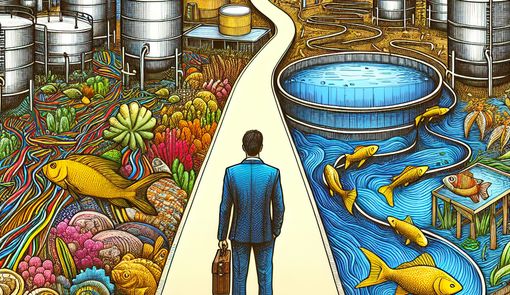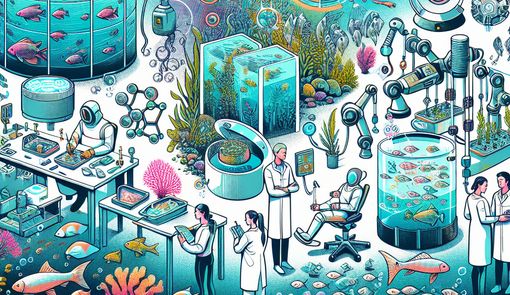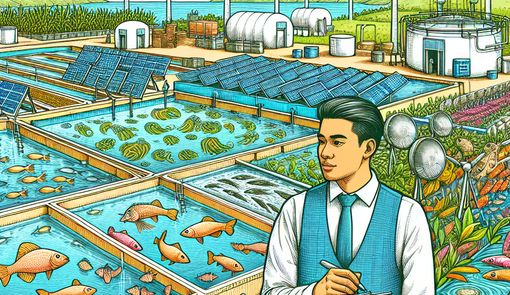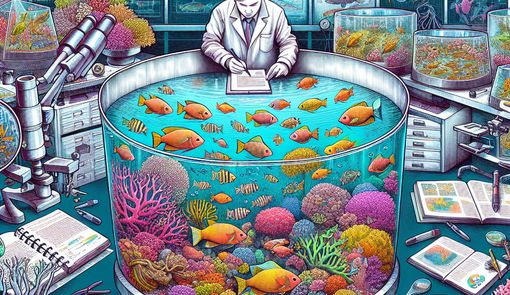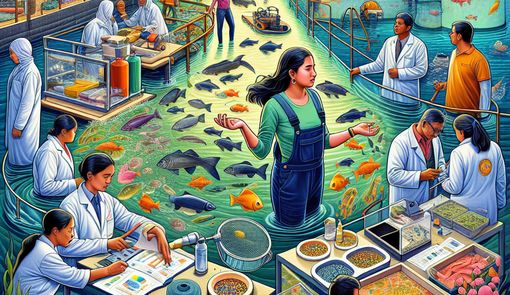Aquaculture Manager
An Aquaculture Manager oversees the breeding and harvesting of fish and shellfish in marine or freshwater farms. They ensure sustainable practices and manage the entire aquaculture operation.

Top Articles for Aquaculture Manager
Sample Job Descriptions for Aquaculture Manager
Below are the some sample job descriptions for the different experience levels, where you can find the summary of the role, required skills, qualifications, and responsibilities.
Junior (0-2 years of experience)
Summary of the Role
The Junior Aquaculture Manager will oversee daily operations at our aquaculture facility, ensuring efficient production, compliance with regulations, and sustainable farming practices. This role will focus on the cultivation of aquatic organisms such as fish, shellfish, and aquatic plants.
Required Skills
- Strong organizational and leadership skills
- Effective communication and interpersonal abilities
- Problem-solving and analytical skills
- Teamwork and collaboration
- Basic proficiency in data recording and analysis tools
Qualifications
- Bachelor's degree in Aquaculture, Marine Biology, or a related field
- Understanding of aquaculture systems and aquatic animal health
- Familiarity with the operation and maintenance of farm equipment
- Basic knowledge of environmental and safety regulations
Responsibilities
- Manage day-to-day operations of the aquaculture farm.
- Coordinate feeding schedules and monitor health of aquatic life.
- Supervise and train aquaculture staff.
- Ensure compliance with environmental and safety regulations.
- Assist with breeding programs and selection of stock.
- Implement sustainable farming practices and optimize production methods.
- Maintain records of stock, sales, and purchases.
- Troubleshoot and resolve any issues related to equipment or livestock.
Intermediate (2-5 years of experience)
Summary of the Role
As an Aquaculture Manager, you will oversee various aspects of aquatic farming operations, ensuring that fish and shellfish are bred, raised, and harvested in a sustainable and efficient manner. You will be responsible for managing staff, coordinating production plans, maintaining the health of aquatic stocks, and ensuring compliance with environmental and safety regulations.
Required Skills
- Strong leadership and management abilities.
- Proficient in the use of aquaculture technology and equipment.
- Excellent problem-solving skills and ability to adapt to changing conditions.
- Effective communication skills, both verbal and written.
- Good organizational skills and the ability to manage multiple tasks simultaneously.
- Ability to work in a team and collaborate with other departments.
- Knowledge of water quality management and environmental impact mitigation.
Qualifications
- Bachelor's degree in Aquaculture, Marine Biology, or a related field.
- 2-5 years of experience in aquaculture or a related industry.
- Understanding of aquaculture systems and technology.
- Knowledge of industry regulations, certifications, and best practices.
- Experience in managing staff and operations in an agricultural or aquacultural setting.
Responsibilities
- Direct and oversee the daily management of aquatic farming operations.
- Develop and implement strategies for breeding, raising, and harvesting aquatic stock.
- Monitor water quality and environmental conditions, adjusting protocols as necessary to ensure the health and productivity of stock.
- Manage and train aquaculture staff, assigning duties and establishing work schedules.
- Ensure compliance with industry regulations, certifications, and environmental guidelines.
- Liaise with suppliers, buyers, and other stakeholders in the aquaculture industry.
- Maintain accurate records of stock growth, health, feeding regimes, and production levels.
- Respond to and manage any instances of disease or pests, implementing control measures.
- Coordinate with research staff to adopt new technologies and methods to improve production efficiency and sustainability.
- Manage budgeting, purchasing of supplies, and investment in infrastructure and technology.
Senior (5+ years of experience)
Summary of the Role
The Aquaculture Manager is responsible for overseeing the efficient and profitable operation of a fish farm or aquatic cultivation facility. With extensive experience in aquaculture systems, breeding, nutrition, and disease management, this senior role ensures the sustainment of aquaculture practices and compliance with environmental regulations.
Required Skills
- Excellent management and organizational skills.
- Strong problem-solving abilities and critical thinking.
- Knowledge of aquaculture systems and species-specific requirements.
- Proficiency in water quality control and fish health management.
- Skilled in communication and collaboration with various stakeholders.
- Experience with regulatory compliance and certification processes.
- Financial acumen to oversee budgets and financial planning.
- Adaptability to changing market conditions and environmental regulations.
Qualifications
- Bachelor's degree in Aquaculture, Marine Science, or a related field (Master's preferred).
- Minimum of 5 years of experience in an aquaculture or related marine management role.
- Proven track record of managing a successful aquaculture operation.
- Extensive knowledge of sustainable aquaculture practices and regulatory standards.
- Experience in budgeting, financial planning, and resource allocation.
- Strong leadership and interpersonal skills to effectively manage a team.
- Ability to analyze and interpret data to inform decision-making.
- Familiarity with modern aquaculture technologies and innovations.
Responsibilities
- Manage the daily operations of the aquaculture facility and ensure that production targets are met.
- Oversee fish health and water quality management to minimize losses due to disease or environmental factors.
- Implement and maintain biosecurity measures to safeguard against disease outbreaks.
- Develop and manage the budget for the aquaculture operations, including forecasting and financial planning.
- Collaborate with researchers and industry experts to improve farm practices and adopt innovative aquaculture technologies.
- Ensure compliance with environmental laws and certification standards, such as organic or sustainable seafood guidelines.
- Engage in strategic planning to enhance production efficiency, product quality, and sustainability.
- Coordinate with sales and marketing teams to align production with market demand and trends.
- Lead, train, and mentor staff in best practices of aquaculture, ensuring a skilled and knowledgeable workforce.
- Liaise with governmental and regulatory bodies, ensuring the facility meets all legal requirements.
See other roles in Industrial, Construction, and Energy and Agriculture

